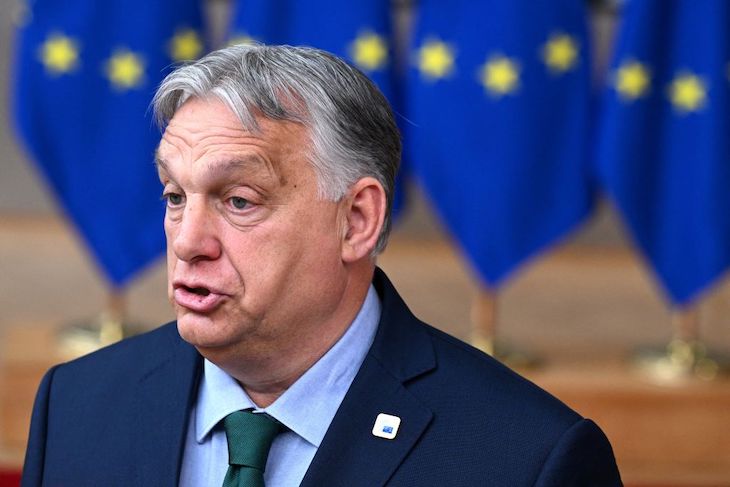Hungary has just begun its presidency of the Council of the EU, as part of the member states’ six-monthly rotation process. Unsurprisingly, prime minister Viktor Orbán is all keyed up for the challenge. For years the bureaucrats of Brussels have tried to force the stubbornly contrary PM to change his ways, withholding billions of euros as punishment for his administration’s ‘democratic backsliding’. But sticking to his guns, Orbán has declared that, on the contrary, it is he who will ‘take over Brussels’ and change the EU. Hubris indeed. After all, David Cameron with his emollient charms was unable to get the EU to alter its entrenched culture, which ultimately led to Brexit. But with the rise of likeminded populist political leaders in Europe – especially Giorgia Meloni in Italy and Marine Le Pen in France – and the continent’s overall rightwards movement, he feels the wind in his sails. Orbán can afford to be cocky. And the country that holds the presidency sets the legislative agenda.
There’s been a significant shift in Hungary’s mood recently
One of Europe’s longest serving leaders, Orbán has been in power for 14 years and has a two-thirds majority in the Hungarian parliament. His championing of traditional family values, patriotism and Christian conservatism has long been popular with the Hungarian public, particularly in the provinces. But there’s been a significant shift in the country’s mood recently. At last Orbán has a proper rival in his disaffected former Fidesz party colleague, 43-year-old lawyer Peter Magyar, who broke away to start his own party, Tisza. He won a seat in the European parliament in last month’s elections, in which Tisza did surprisingly well and is now part of the centre-right European People’s Party grouping.
‘This is the beginning of the end of Fidesz’s grip on power,’ declared Magyar. He said Orbán had been running a ‘feudalistic’ state, with rampant corruption. It is indisputable that the PM’s friends and family have benefitted mightily from his patronage, the general public less so. Magyar promises to end cronyism in Hungarian politics and ‘restore the rule of law’. He and his Tisza MEPs aim to secure positions of power on parliamentary committees, thereby helping to shape EU legislation.
While Fidesz remains Hungary’s largest party in the European Parliament, it achieved its worst ever result in the May elections, receiving only 44.6 per cent of the vote, and 11 MEPs, (to Tisza’s 30 per cent and seven MEPs).
As Fidesz has been politically homeless in the EP since 2021, when it pulled out of the European People’s Party (before it could be ousted on grounds of weakening Hungary’s judiciary), its legislators are somewhat limited in influence. But none of this has dampened Viktor Orbán’s self-confidence and belief that, with Hungary as holder of the presidency, he can stamp his unmistakable brand on Brussels. His new motto is ‘Make Europe Great Again’, a nod to his pal Donald Trump. ‘It’s MAGA here and MEGA there,’ quipped Trump contentedly.
As Orbán is the outlier with regard to Europe’s support for Ukraine in the war against Russia, his opponents in the EP expect further clashes over the issue with Fidesz MEPs. Accession talks have just begun over EU membership for Ukraine and Moldova, and diplomats are worried about how these will progress, with Hungary holding the presidency. While Orbán is in favour of admitting Moldova, he has stated categorically that Ukraine is not ready for membership, especially while the war is on. Time and again, Orbán has angered Western leaders by seeming to take Vladimir Putin’s side over Volodymyr Zelensky’s. Oh the irony, considering how a fiery young Orbán, back in 1989, helped bring about the end of communism and Soviet power in Hungary.
I am currently visiting Budapest, city of my birth. And intriguing as Hungary’s present political manoeuvrings are, I can never spend time here without reflecting on the past. The friend’s apartment in central Pest where I am staying is around the corner from Corvin Passage. This is the site of some of the fiercest battles of the Hungarian Revolution in October/November 1956. The Corvin cinema on this little U-shaped street was the command centre for a famous militia unit which, in the early stages of the uprising, gave the Soviets a real pounding, inflicting heavy casualties on them and blowing up any tanks which dared enter the precinct. But alas, we all know how the revolution ended. And with the reimposition of iron-fisted Soviet rule, my family fled to the West.
I’ve no idea how things will pan out for Hungary’s EU presidency over the next six months as it challenges the old guard in Brussels. But the path my own life has followed was determined long ago by the bloody events here on the streets of Budapest. It’s something I contemplate as I sit in the cafe opposite the old Corvin cinema – yes, it’s still here in all its heroic glory, now displaying commemorative plaques to the fallen of 1956.
One way or another, we are all the creatures of war, revolution …. and politics.

